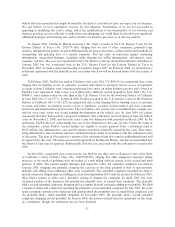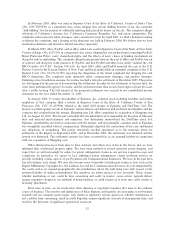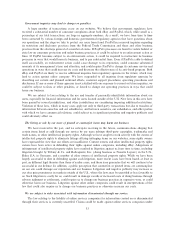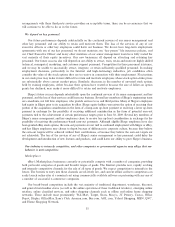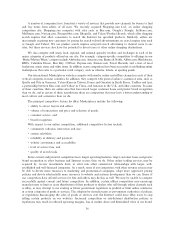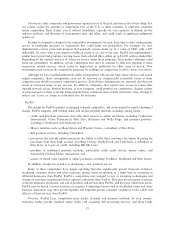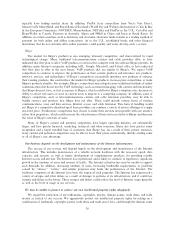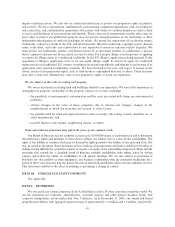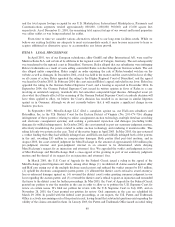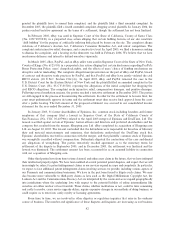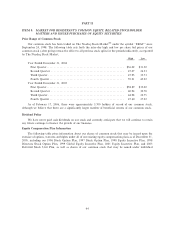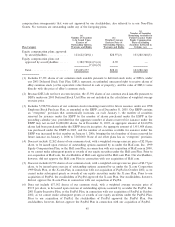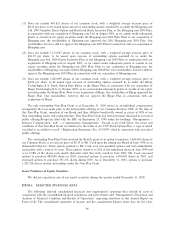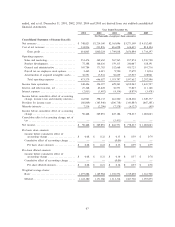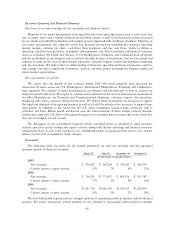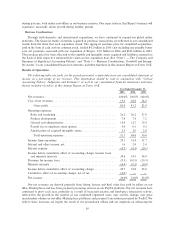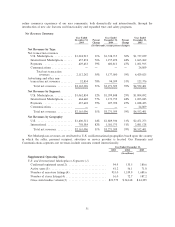eBay 2005 Annual Report Download - page 45
Download and view the complete annual report
Please find page 45 of the 2005 eBay annual report below. You can navigate through the pages in the report by either clicking on the pages listed below, or by using the keyword search tool below to find specific information within the annual report.rejecting all of the claims contained in the patent that related to online auctions; in March 2005, the Patent and
Trademark Office issued an initial ruling rejecting all of the claims contained in the patent that related to electronic
consignment systems; and in May 2005, the Patent and Trademark Office issued an initial ruling rejecting all of the
claims contained in the patent that related to multiple database searching. Even if successful, our litigation of these
matters will continue to be costly. In addition, as a precautionary measure, we have modified certain functionality
of our websites and business practices in a manner which we believe would avoid any further infringement. For this
reason, we believe that any injunction that might be issued by the district court will not have any impact on our
business. We also believe we have appropriate reserves for this litigation. Nonetheless, if we are not successful in
appealing or modifying the court's ruling, and if the modifications to the functionality of our websites and business
practices are not sufficient to make them non-infringing, we would likely be forced to pay significant additional
damages and licensing fees and/or modify our business practices in an adverse manner.
In August 2002, Charles E. Hill & Associates, Inc. filed a lawsuit in the U.S. District Court for the Eastern
District of Texas (No. 2:02-CV-186) alleging that we and 17 other companies, primarily large retailers,
infringed three patents owned by Hill generally relating to electronic catalog systems and methods for
transmitting and updating data at a remote computer. The suit seeks an injunction against continuing
infringement, unspecified damages, including treble damages for willful infringement, and interest, costs,
expenses, and fees. The case was transferred to the U.S. District Court for the Southern District of Indiana in
January 2003, but was transferred back to the U.S. District Court for the Eastern District of Texas in December
2003. A claim construction hearing was held in August 2005. In February 2006, we entered into a settlement
agreement with the plaintiffs in the case under which we will be licensed under all of the patents at issue.
In February 2002, PayPal was sued in California state court (No. CV-805433) in a purported class action
alleging that its limiting access to customer accounts and failure to promptly restore access to legitimate
accounts violates California state consumer protection laws and is an unfair business practice and a breach of
PayPal's User Agreement. This action was re-filed with a different named plaintiff in June 2002
(No. CV-808441), and a similar action was also filed in the U.S. District Court for the Northern District of
California in June 2002 (No. C-02-2777). In March 2002, PayPal was sued in the U.S. District Court for the
Northern District of California (No. C-02-1227) in a purported class action alleging that its limiting access to
customer accounts and failure to promptly restore access to legitimate accounts violates federal and state
consumer protection and unfair business practice laws. The two federal court actions were consolidated into a
single case, and the state court action was stayed pending developments in the federal case. In June 2004, the
parties announced that they had reached a proposed settlement. The settlement received approval from the
federal court on November 2, 2004, and the state court action was dismissed with prejudice in March 2005. In
the settlement, PayPal does not acknowledge that any of the allegations in the case are true. Under the terms
of the settlement, certain PayPal account holders are eligible to receive payment from a settlement fund of
$9.25 million, less administrative costs and the amount awarded to plaintiffs' counsel by the court. That sum is
being distributed to class members who have submitted timely claims in accordance with the settlement's plan
of allocation. The plan of allocation for a portion of the settlement fund that remains undistributed must still
be approved by the court. That plan was recently approved by the Special Master, who has recommended that
the District Court issue its approval. Substantially all of the cost associated with the settlement was reserved in
2003.
In July 2004, a purported class action lawsuit was filed by two eBay users in Superior Court of the State of
California, County of Santa Clara (No. 104CV022708) alleging that eBay engaged in improper billing practices as
the result of problems with the rollout of a new billing software system in the second and third quarters of 2004.
The lawsuit sought damages and injunctive relief. An amended complaint was filed in January 2005, dropping one
plaintiff, changing the capacity of the other plaintiff to that of representative plaintiff, and adding seven additional
eBay users as plaintiffs. The amended complaint expanded its claim to include numerous alleged improper billing
practices from September 2003 until the present. In February 2005, eBay filed a motion to strike and a demurrer
seeking to dismiss the complaint. In April 2005, the court sustained portions of the demurrer, but granted the
plaintiffs leave to amend their complaint. The plaintiffs filed a second amended complaint, dropping the last
original plaintiff and again adding new plaintiffs. We filed a motion to strike and a demurrer regarding the
plaintiffs' second amended complaint. In July 2005, the court again sustained a portion of the demurrer and again
41


